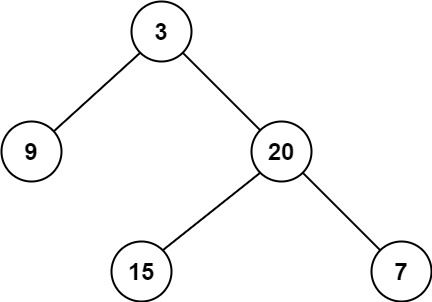Given a binary tree, find its minimum depth.
The minimum depth is the number of nodes along the shortest path from the root node down to the nearest leaf node.
Note: A leaf is a node with no children.
Example 1:
Input: root = [3,9,20,null,null,15,7] Output: 2
Example 2:
Input: root = [2,null,3,null,4,null,5,null,6] Output: 5
Constraints:
- The number of nodes in the tree is in the range
[0, 105]. -1000 <= Node.val <= 1000
# Definition for a binary tree node.
# class TreeNode:
# def __init__(self, val=0, left=None, right=None):
# self.val = val
# self.left = left
# self.right = right
class Solution:
def minDepth(self, root: TreeNode) -> int:
if root is None:
return 0
if root.left is None:
return 1 + self.minDepth(root.right)
if root.right is None:
return 1 + self.minDepth(root.left)
return 1 + min(self.minDepth(root.left), self.minDepth(root.right))/**
* Definition for a binary tree node.
* public class TreeNode {
* int val;
* TreeNode left;
* TreeNode right;
* TreeNode() {}
* TreeNode(int val) { this.val = val; }
* TreeNode(int val, TreeNode left, TreeNode right) {
* this.val = val;
* this.left = left;
* this.right = right;
* }
* }
*/
class Solution {
public int minDepth(TreeNode root) {
if (root == null) {
return 0;
}
if (root.left == null) {
return 1 + minDepth(root.right);
}
if (root.right == null) {
return 1 + minDepth(root.left);
}
return 1 + Math.min(minDepth(root.left), minDepth(root.right));
}
}/**
* Definition for a binary tree node.
* struct TreeNode {
* int val;
* TreeNode *left;
* TreeNode *right;
* TreeNode() : val(0), left(nullptr), right(nullptr) {}
* TreeNode(int x) : val(x), left(nullptr), right(nullptr) {}
* TreeNode(int x, TreeNode *left, TreeNode *right) : val(x), left(left), right(right) {}
* };
*/
class Solution {
public:
int minDepth(TreeNode* root) {
if (root == nullptr) {
return 0;
}
if (root->left == nullptr) {
return 1 + minDepth(root->right);
}
if (root->right == nullptr) {
return 1 + minDepth(root->left);
}
return 1 + min(minDepth(root->left), minDepth(root->right));
}
};
